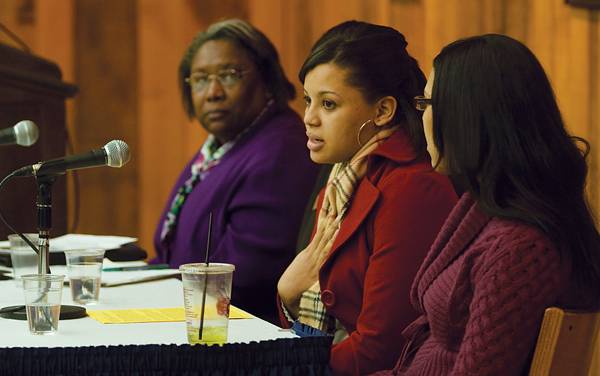Panelists discuss campus diversity

Bri McGriff, senior in political science, shares some of the struggles she has faced as an African-American woman here at Iowa State University during the Campus Conversation on Diversity, yesterday in the Pioneer Room of the Memorial Union. The meeting gave students and faculty a chance to share and discuss ways in which Iowa State University can improve the experience for every diverse race represented. Photo: Valerie Allen/Iowa State Daily
January 29, 2009
A group of four panelists shared their thoughts on diversity in Ames and the Iowa State community Thursday, as part of the Martin Luther King Jr. Day Celebration.
Barbara Woods, an extension specialist in family and consumer sciences, said an excellent step in the right direction for the Ames community was the Community Conversation on Diversity events that took place last fall.
The conversations consisted of eight to 12 diverse individuals discussing their ideas for making Ames a stronger, more inclusive community.
“There were people of different race, religion, gender, economic status and levels of education,” she said.
Although Woods has lived in Ames for 30 years, the conversation groups enabled her to talk openly for the first time in a group about topics that make people feel uncomfortable in a group.
Thursday’s conversation brought up the uncomfortable topic of affirmative action.
Francesca Galarraga, assistant director for the equal opportunity and diversity office , said she believes many people have misconceptions about Iowa State’s affirmative action policy. She said many are under the impression that affirmative action is some sort of favoritism.
“We make a good effort to look at the people in our community and try to allow differing ideas to be heard,” she said.
Galarraga said that Iowa State prides itself on being innovators.
“The best way to innovate is to integrate,” she said. “We look for individuals that can enhance the conversation.”
Bri McGriff, senior in political science, said she feels well-rounded academically because of her studies at Iowa State. However, as a student of color, she doesn’t feel as though her social experience has been quite as rewarding.
“I feel like I keep seeing the same student leaders everywhere I go,” she said. “Nothing will change if the same people continue to be in these conversations.”
McGriff expressed concerns about not having enough time to meet new people and become friends with those from a different racial background.
“I’m very involved in my own community and supporting it on campus,” she said.
McGriff said she would have appreciated more guidance in her time at Iowa State. Programs that used to be in place, such as Band of Brothers, are no longer available to assist students.
“Having a diverse campus is great, but if they aren’t contributing to the conversation and getting involved – possibly because they feel alienated in a new environment, it isn’t the same,” she said.
In her last semester as an undergraduate student, McGriff plans to help minority students get involved in more leadership groups on campus.
McGriff also believes the university needs to work on increasing links and relations with Greek organizations and other councils, not just further diversity itself.
The audience seemed to be in favor of the notion that people seek out those who are like them, making invisible barriers a commonality. The audience wanted to mix ISU students together and “shake things up.”
“Although students primarily come to college to get an education, they want to experience the social aspect of it, too,” McGriff said.
McGriff said she believes that many minorities are not experiencing Iowa State to its full capacity.
“ISU needs to be supportive of its students academically and socially,” she said.
Woods said for her, one white professor made the difference. The professor went out of her way to approach her and help her through her time at Iowa State. Woods said in part, she attributes the kind heart of the professor to the fact that she’s lived in Ames for the last 30 years.
Although the panel agreed that when it comes to diversity and the way it’s treated at Iowa State, there is much room for improvement, it was noted that the university has made some positive changes in the right direction.
Galarraga said Ames looks different than it did a decade or two ago.
Galarraga said the positive new face of Iowa State could be attributed to “a diverse pool of talent that comes to Ames and the university actively looking at ways to diversify the population.”
The panel encouraged guests to leave with the understanding that each student and faculty member must take responsibility to help embrace diversity on campus and must be aware of who can be brought to the table and who will be committed to making another step for our university.






